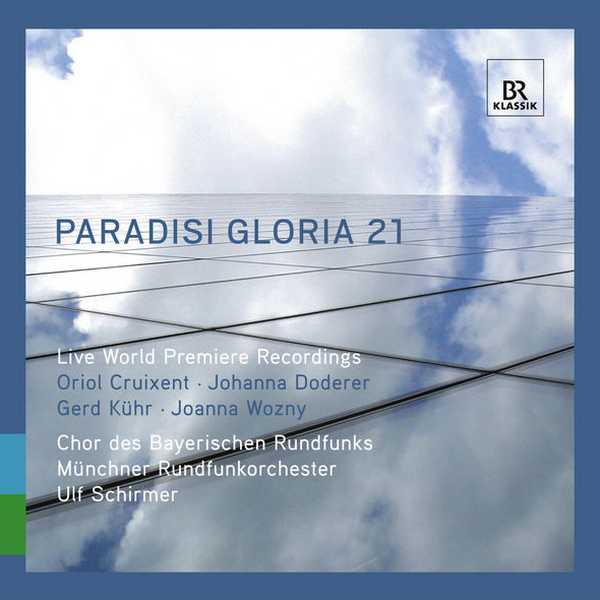
Composer: Oriol Cruixent, Johanna Doderer, Gerd Kuhr, Joanna Wozny
Performer: Angelika Luz, Adrian Eröd, Marlis Petersen, Chor des Bayerischen Rundfunks
Orchestra: Münchner Rundfunkorchester
Conductor: Ulf Schirmer
Format: FLAC (tracks)
Label: BR Klassik
Catalogue: 900302
Release: 2010
Size: 318 MB
Recovery: +3%
Scan: yes
01. Cruixent: Abismes for Orchestra
Kuhr: Introductio – Meditatio – Magnificat – Epilogus
02. I. Introductio et Meditatio
03. II. Magnificat
04. III. Fecit potentiam
05. IV. Suscepit Israel – Epilogus
06. Wozny: Archipel
07. Doderer: Salve Regina
Live World Première Recordings by Oriol Cruixent, Johanna Doderer, Gerd Kühr, Joanna Wozny.
“Paradisi gloria 21” – under this title, this CD combines four world première recordings of 21st century sacred works. All the compositions were commissioned by Bavarian Broadcasting and employ different musical forces to reveal the wide stylistic palette of contemporary sacred music. While the works by Oriol Cruixent and Gerd Kühr treat the “Magnificat” theme, Joanna Wozny and Johanna Doderer offer approaches to the figure of Mary, the mother of God, in their compositions. With the Münchner Rundfunkorchester and the Chor des Bayerischen Rundfunks we have two ensembles with tremendous experience in the interpretation of new music. The Paradisi gloria concert series, initiated in the year 2000 by Marcello Viotti, and carried forward since 2006 by Ulf Schirmer, forms the heart of contemporary sacred orchestral and choral music in Munich’s musical life and, beyond this, also enjoys international renown.
Four world premières by the new generation of composers combined on a single CD.
Conductor Ulf Schirmer and the Münchner Rundfunkorchester regularly commission new works, and this release includes live performances of the premieres of pieces from 2008 and 2009, with Mary and Magnificat as the theme. The premieres include works, each about 20 minutes long, some for orchestra alone and some including chorus and soloists, by four composers born between 1952 and 1973. Catalan composer Oriol Cruixent’s Abismes for orchestra is a fairly conventional modernist tone poem that moves from a depiction of chaos to joyful affirmation, with the orchestral players intoning words from the Sermon on the Mount at the end. Introductio – Meditatio – Magnificat – Epilogus for high soprano, baritone, chorus, and orchestra by Austrian Gerd Kühr is more musically adventurous and interesting; his spare, unemotional style, reflecting his religious skepticism, is at odds with the ecstatic text of the Magnificat, but as a purely musical experience the piece is inventive and effectively dramatic. Joanna Wozny, born in Poland but trained in Austria, has written that her intent with Archipel for large orchestra was to create an atmosphere of quiet and stillness, and she succeeds. The meditative piece is mostly static and very, very quiet, with the extensive orchestral forces deployed judiciously to create a variety of subdued tone colors. Salve Regina, by Austrian Johanna Doderer is scored for soprano, chorus, and orchestra, and comes closest to being the kind of piece one would expect based on the theme. Although this is clearly a contemporary work that uses an array of 20th century compositional techniques, the music has a rhapsodic grandeur and sweep, and is essentially tonal, even sumptuously neo-Romantic. The performances by Schirmer and the Münchner Rundfunkorchester and Chor des Bayerischen Rundfunks are very fine, although only the Doderer gives them the opportunity to demonstrate their capacity for producing a big, conventionally beautiful orchestral and choral sound. Baritone Adrian Eröd is adequate in the Kühr, but soprano Angelika Luz is painfully shrill, due at least in part to the insensitivity of the vocal writing. In contrast, soprano Marlis Petersen is absolutely radiant in her large, lyrically gratifying role in the Doderer. The sound of the live recordings is clean, with little distracting noise, but somewhat flat and not very lively.